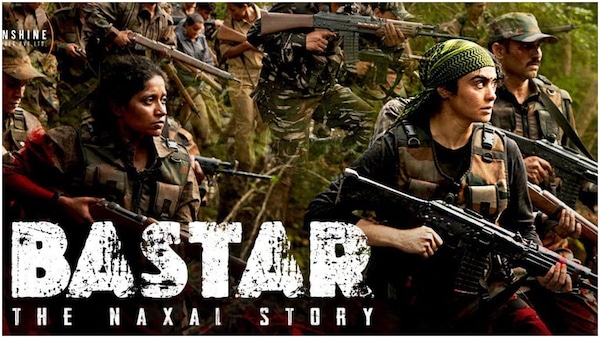Bastar – The Naxal Story Review – Adah Sharma starrer is a confused product that is far from even convincing itself
Bastar: The Naxal Story comes out of the same mill that made The Kerala Story and tries to hard to show that it is an unbiased piece of art.

Last Updated: 07.05 PM, May 17, 2024
Set in Bastar, a forest-covered landscape in the heart of Chhattisgarh, Bastar: The Naxal Story captures the lives of the oppressed folks of many villages from the landscape and how the Maoist organization has made their life a living hell. A righteous defense officer decides to eradicate the Maoist organization from the area and bring back happiness.
Bastar: The Naxal Story: Review
The fact that this review caters only to a niche section of society, and loyalists to films like these and the filmmakers propagating them will watch it regardless, in itself means these movies that open with the disclaimer that they are ‘a work of imagination inspired by real-life stories’ have penetrated the system in a much more influential way than you and I can even think of. So when the disclaimer opens with the line ‘inspired by real-life incidents’ and quickly transcends to ‘creative liberties have been taken,’ you hope that you can make many more people understand the meaning and the reverse impact this trajectory is causing.
Bastar: The Naxal Story is The Kerala Story director and writer Sudipto Sen reuniting with his producer Vipul Amrutlal Shah, who is also the co-writer on this project with Amarnath Jha. The film opens with a court argument that is between a group of individuals trying to save the Maoists and the other against it, there is a sense of ‘look we are unbiased this time’ with the word go. However, Bastar this time around isn’t letting you even scratch the surface to see what is beneath because it is so confused with its own voice that it ends up being a convoluted product that fails to find one hook.
ALSO READ: Music plays an extremely important role in Bastar The Naxal Story, says Adah Sharma | EXCLUSIVE
It feels like a one-word brief given to the writers and director of the movie was ‘Shock Value’ because that is the only thing that they are dedicated to serving. Jump scares after jump scares with no nuances between them end up being a pointless affair. This indeed is a very severe subject, and the atrocities that are committed by the Naxals on people are certainly a real fact. But when a movie is only hell-bent on showing how bad these people are and how bad the ones supporting them are, there are still no solutions. The lead of your movie by the end saying she will finish the left liberals takes away the very facade of ‘unbiased’ storytelling in a second.
That brings back the same question, what about the solutions? Are we supposed to roam around killing everyone who is not our ideology? Is changing the name of JNU to INU while the actors while acting have said JNU a very subtle way to avoid controversies? And is there proof of the accusations that the students cheered for Maoist groups? What are the bases of this ‘research’ and where do these numbers exactly come from?
But the movie is far away from representing any ideology because it is a very bizarre mess, as you don’t know what timeline is this exactly. When is the court hearing taking place, when is the combat happening, are these two happening in the same year, and how does Indira Tiwari’s character travel to a distant place in a couple of minutes while she was saving her son moments ago? These are bizarrely put things and that takes away any little merit the movie holds.
There is a good parallel storyline where both a mother and a son are taking training for different forces. Mother to become a police officer, son to become a Maoist. Now, while this is a haunting trajectory and there is a spectacular actor like Indira Tiwari on the screen it helps, but it is suddenly killed when the son goes through a change in heart in seconds if not minutes.
Adah Sharma is trying too hard to be an army officer that will set an example for actors and you can see all the efforts on her face. The performance feels more like a school play life affair than a feature film. Rest everyone gets a one-tone character to play with a set trajectory that doesn’t have a complex route at all. The movie shifts gears more than once and the characters stay on the same path with no complexities.
Bastar: The Naxal Story: Final Verdict
One must always watch these movies with an open perspective and also keep in mind that Cinematic liberties have been taken and this is not the core truth anymore. Bastar is problematic on a structural level and we are not even getting into the politics of it. It is a movie that probably wants to provoke and not educate. there is no quest for solutions but the intensification of hate.
Subscribe to our newsletter for top content, delivered fast.

